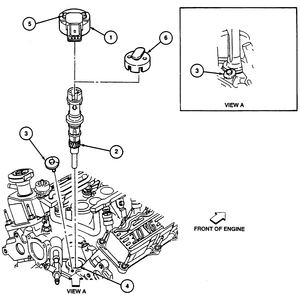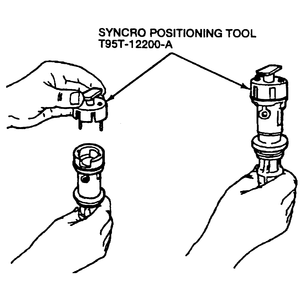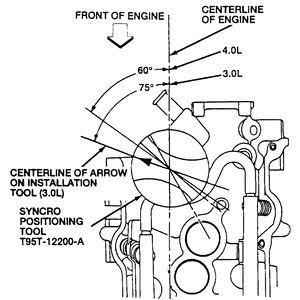NOTE: According to the manufacturer, the A/C system, if equipped,
must be discharged for this procedure. Have your A/C system refrigerant reclaimed
by an MVAC certified repair shop. However, there may be enough flex or slack
in the A/C lines to allow you to support the compressor off to the side without
disconnecting the lines.
- Disconnect the negative battery cable.
- Remove the accessory drive belt.
- Remove the four bolts securing the A/C compressor to the mounting bracket
and set aside.
- Remove the three compressor/power steering bracket retaining bolts.
- Pull the bracket, with the power steering pump attached, away from the engine
and position it aside.
- Disconnect the engine control sensor wiring from the camshaft position sensor.
- Remove the two CMP mounting bolts and then pull the sensor from the oil
pump.
To install:
- Install the CMP sensor to the oil pump and tighten the two mounting screws
to 45–61 inch lbs. (5–7 Nm).
- Reconnect the engine control sensor wiring to the sensor.
- Position the bracket, with the power steering pump attached, to the engine.
- Install the three compressor/power steering bracket retaining bolts and
tighten securely.
- Install the A/C compressor to the mounting bracket and tighten the four
mounting bolts.
- Install the accessory drive belt.
- Connect the negative battery cable. Start the engine and check for leaks.
Refer to Section 2 in this manual for distributor removal and installation.
NOTE: If the camshaft position sensor housing does not contain
a plastic locator cover tool, a special service tool such as T89P-12200-A, or
equivalent, must be obtained prior to installation. Failure to follow this procedure
may result in improper stator alignment. This will result in the fuel system
being out of time with the engine, possibly causing engine damage.
- Disconnect the negative battery cable.
- Remove the ignition coil, radio capacitor and ignition coil bracket.
- Disengage the wiring harness connector from the CMP sensor.
NOTE: Prior to removing the camshaft position sensor, set
the No. 1 cylinder to 10°After Top Dead Center (ATDC) of the compression
stroke. Note the position of the sensor electrical connection. When installing
the sensor, the connection must be in the exact same position.
- Position the No. 1 cylinder at 10°ATDC, then matchmark the CMP sensor
terminal connector position with the engine assembly.
- Remove the camshaft position sensor retaining screws and sensor.
- Remove the retaining bolt and hold-down clamp.
NOTE: The oil pump intermediate shaft should be removed
with the camshaft sensor housing.
- Remove the CMP sensor housing from the front engine cover.
| Fig. 1: Exploded view of the Camshaft Position (CMP)
sensor mounting for the 3.0L engine — 4.0L engine
is similar

|
To install:
- If the plastic locator cover is not attached to the replacement camshaft
position sensor, attach a synchro positioning tool, such as Ford Tool T89P-12200-A
or equivalent. To do so, perform the following:
- Engage the sensor housing vane into the radial slot of the tool.
- Rotate the tool on the camshaft sensor housing until the tool boss engages
the notch in the sensor housing.
NOTE: The cover tool should be square and in contact
with the entire top surface of the camshaft position sensor housing.
| Fig. 2: Attach the CMP synchro positioning tool
to the housing

|
| Fig. 3: CMP sensor positioning for the 3.0L (75)
and 4.0L (60) engines

|
- Transfer the oil pump intermediate shaft from the old camshaft position
sensor housing to the replacement sensor housing.
- Install the camshaft sensor housing so that the drive gear engagement occurs
when the arrow on the locator tool is pointed approximately 30°counterclockwise
(the sensor terminal connector should be aligned with its matchmarks) from
the face of the cylinder block.
- Install the hold-down clamp and bolt, then tighten the bolt to 15–22
ft. lbs. (20–30 Nm).
- Remove the synchro positioning tool.
CAUTION
If the sensor connector is positioned correctly, DO NOT reposition the connector
by rotating the sensor housing. This will result in the fuel system being
out of time with the engine. This could possibly cause engine damage. Remove
the sensor housing and repeat the installation procedure beginning with
step one.
- Install the sensor and retaining screws, tighten the screws to 22–31
inch lbs. (2–4 Nm).
- Attach the engine control sensor wiring connector to the sensor.
- Install the ignition coil bracket, radio ignition capacitor and ignition
coil.
- Connect the negative battery cable.



